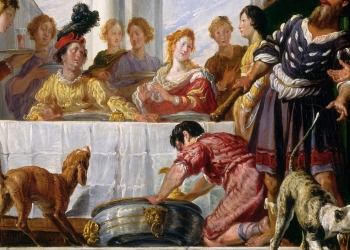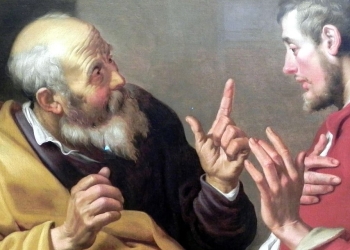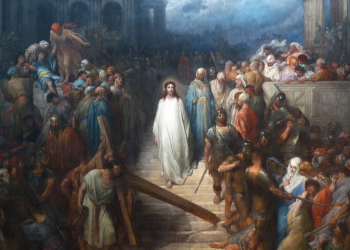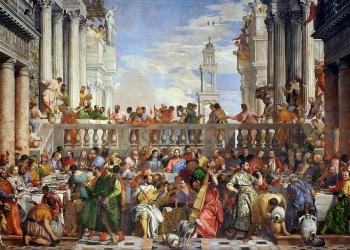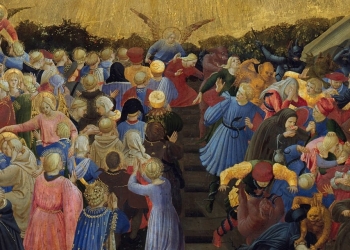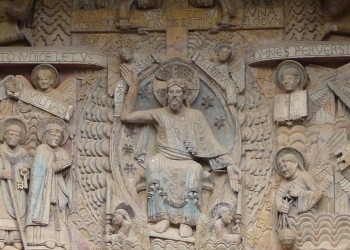September 28, 2025
XXVI Sunday of Ordinary Time C
Lk 16:19-31
We could read todays passage from the Gospel (Lk 16:19-31, Lazarus and the Rich Man) according to the key provided by the image of a banquet.
In fact, the parable of Jesus that we find at the end of chapter XVI speaks precisely of this, of a banquet.
There are two main characters, a rich man whose name we do not know, and a poor man called Lazarus. But only one of them, the rich man, takes part in the banquet. Lazarus, on the other hand, remains outside the door and cannot even feed on the crumbs that fall from the table at which the rich man dines sumptuously every day (Luke 16:19-21).
The image of the banquet appears often in the Gospels. Jesus likes to feast, and his guests are usually poor, public sinners, people of little value: no one is excluded from his banquet. Jesus is often invited, but it also happens that He is the one who gives a banquet, and then the bread is multiplied for everyone (cf. Lk. 9:12-17).
Even as the resurrected Jesus sits at table with His own, and among the most beautiful scenes in which Jesus reveals himself to the disciples are several banquets, in Jerusalem, Emmaus or by the Sea of Galilee.
Jesus somehow uses the image of the banquet to talk about God, about his Father. For who is God if not a Father, a King who gives a great banquet? A rich banquet, where there is no lack of bread or wine, for everyone.
And even where some might initially feel excluded, as with the Syro-Phoenician woman (Mk 7:24-30), it happens that this woman is certain that this banquet is so abundant that even the crumbs can suffice to satisfy her hunger for life and salvation.
In our parable today we find all this. There is an abundant banquet, but there is someone who does not even have access to the crumbs. There is a feast, a place of friendship and fellowship, but someone is excluded from it all and is left alone.
And there is a man, a rich man, who could be generous, just as God is generous, but who is not. He breaks no laws, he does nothing wrong, he does not corner the poor man. He stands at his door, but he does not see him.
The verb to see only appears in the second part of the parable (Lk 16:23), where the narrative shifts to life after death.
In fact, both protagonists die at some point, but only Lazarus is taken into Abraham’s bosom, i.e. into communion with God (Lk 16:22).
In the afterlife, there is indeed nothing of all that the rich man had built his life on: there is no wealth, no luxury. In the hereafter, there are only people and the bond that was forged with them on this earth, also thanks to the dishonest wealth that last Sunday’s Gospel told us about.
It then becomes clearer to us that the reversal of fortune to which the protagonists go does not so much speak of a God who chastises and punishes. Rather, it says that through our daily choices we prepare our future and our eternity, in which the seeds of goodness and community that we have sown down here will sprout. Everything else will wither and prove its insubstantiality.
And it is important to emphasize that these decisions are not made by great deeds, but by small things: Lazarus would have been content with crumbs to say that the rich man was not asked to give up everything he owned, but only to have the mercy to step out of the circle of his little world for a little while. He was only asked for a glimpse.
Now, in the afterlife, even the rich man does not ask for great things: he too asks for mercy and only wants a drop of water: “He called out, ‘Father Abraham, have mercy on me, and send Lazarus to dip the tip of his finger in water and cool my tongue; for I am in agony in these flames” (Luke 16,24). But the abyss he himself had dug makes this small and simple thing impossible. The door that he kept closed now remains closed.
But that the rich man did not enter into this logic of smallness is also shown by the request he makes to Abraham for his brothers and for his father's house: He wants a great sign for them, an extraordinary sign, like that of a dead man appearing before them to admonish them (“If someone goes to them from the dead, they will repent” - Luke 16,30).
However, conversion does not take place through resounding miracles, but through the humble and patient experience of listening to the word (“Abraham replied, ‘They have Moses and the prophets; the should listen to them” and “If they do not listen to Moses and the prophets, neither will they be convinced even if someone rises from the dead” - Lk 16:29, 31).
Conversion does not happen through fear, but through a gaze that is able to stop at the other person's need and share with them something of the little that one has and is.
+ Pierbattista


